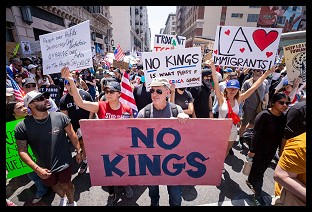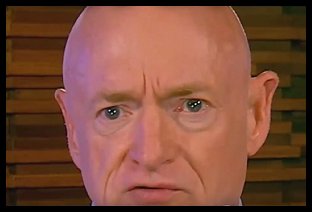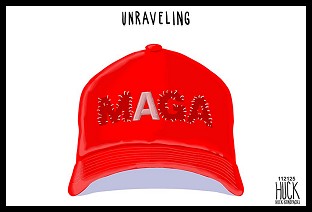Guest blogged by John Gideon, VotersUnite.Org
In an October BRAD BLOG article we reported that a court-ordered report highly negative of Sequoia Voting Systems products being used throughout New Jersey could soon be released to the public. Prior to the release date, and then again last week, Sequoia Voting Systems attacked both the report and its author, Princeton University computer science professor Andrew Appel.
On December 18, Sequoia issued a press release with a misleading title and subtitle:
Appel ordered by judge to apologize and pay motion legal fees to Sequoia Voting Systems in Reed Guscoria, et al., Plaintiffs vs. James E. McGreevey, et al., Defendant
And, on the company's blog, written by VP of Communications and External Affairs Michelle Shafer, she continues the lie:
In an email to this writer, Professor Appel responded to what he says are "false statements about me in two recent press releases" from Sequoia. The BRAD BLOG posts his response in full below, with his express permission...
On November 21, 2008, I agreed to a consent decree, apologizing to the Court, not to Sequoia, "to the extent the terms of the protective order were not complied with." Judge Feinberg said on the record that this is "not a sanction." Judge Feinberg never concluded that I violated the order, notwithstanding her preliminary statements (quoted by Sequoia) about her preliminary inclinations prior to the full hearing.
The Protective Order in question is a complicated and ambiguous document (much more so than other Protective Orders that I have been bound by when serving as an expert witness in other cases, such as the New York v. Microsoft antitrust case). The P.O. has two goals, broadly speaking:
(1) for an unlimited time, to prevent leakage of Sequoia's trade-secret Source Code and other trade-secret Confidential Information
(2) for a limited time, to prevent the release of, and public discussion of, the conclusions of my examination--until 30 days after I delivered it to the Court, to the State defendants, and to Sequoia--so that those parties could have time to prepare their response.
I have never leaked Sequoia's trade-secret Source Code. I did not release my report before the date ordered by the Court. I did not discuss my conclusions in the media before that date.
Sequoia is making its accusations based on two incidents that Sequoia interprets as violations of the Protective Order, but that I do not believe are violations. (1) In August 2008, I asked Professor Edward Felten, who was also serving as an expert witness for the Plaintiffs, to review my report. Since the report did not contain trade-secret information, and since his review of my report did not constitute "publicizing in any media", there is no violation there. (2) One day before the authorized release date, in an affidavit filed in a Louisiana Court, I mentioned the existence of that report and characterized in one or two sentences one conclusion of that report; this conclusion overlapped with statements I had already in public over a year previously. There was no public discussion of this affidavit either in the media or in the blogosphere, and certainly not in the 24 hours between the time it was filed in a Louisiana Court and the time that the New Jersey Court authorized public release of my report. Thus I believe there is no violation there either.
Sequoia may believe that these are violations; the Court did not reach any such conclusion. Sequoia should not continue to falsely claim that the Court sanctioned me for these incidents, nor that the Court ordered me to apologize to Sequoia, or that I did so. None of these assertions is true.
Andrew W. Appel
Princeton, New Jersey
December 24, 2008
Appel's analysis of New Jersey's Sequoia Advantage (touch-screen) voting systems was ordered by a court following problems with the system during the state's Super Tuesday primary in dozens of counties were vote totals were misreported.
In March of this year, Sequoia threatened Appel with a lawsuit if he dared carry out an inspection of their faulty systems, as requested by NJ's county clerks.
In April of this year, the problems on NJ's voting systems were found by another Princeton scientist to be worse than originally thought.
Beyond NJ, it was a very bad year for Sequoia (and for the voters forced to use their systems). Following the problems in NJ, their own website was hacked. Late this year, the D.C. Board of Elections found their paper-based optical-scanned system added thousands of "phantom votes" in a single precinct, and in Palm Beach County, FL their op-scanners had trouble counting the same ballots the same way twice.
Appel has long been a thorn in Sequoia's side. In February of 2007, after buying several Sequoia Advantage systems online for $86 (the state had paid more than $8,000 for each of them), he was able to hack them in minutes time. And just last week, Appel posted a video showing how he was able to easily defeat security seals used by Sequoia to protect their systems from malicious tampering.
Furthermore, in an investigative BRAD BLOG exposé last May, we revealed the fact that Sequoia does not even own the intellectual property rights to its own voting systems, despite their claims in public and in the courts. Rather, those rights are owned by the Brazilian firm Smartmatic, which Sequoia had claimed to divest from following a federal probe last year.


 With Thanks, No Kings and Good Cheer
With Thanks, No Kings and Good Cheer Presidential Illegality and the Duty to Disobey
Presidential Illegality and the Duty to Disobey Sunday 'Leave 'em in Stitches' Toons
Sunday 'Leave 'em in Stitches' Toons President of United States Calls for Killing Democratic Officials: 'BradCast' 11/20/25
President of United States Calls for Killing Democratic Officials: 'BradCast' 11/20/25 'Green News Report' 11/20/25
'Green News Report' 11/20/25
 Is MAGA Finally Beginning to Fall Apart?: 'BradCast' 11/19/25
Is MAGA Finally Beginning to Fall Apart?: 'BradCast' 11/19/25 Trump's Terrible, Horrible,
Trump's Terrible, Horrible, 'Green News Report' 11/18/25
'Green News Report' 11/18/25 A Kaleidoscope of Trump Corruption: 'BradCast' 11/17/25
A Kaleidoscope of Trump Corruption: 'BradCast' 11/17/25  Sunday 'Back to Business' Toons
Sunday 'Back to Business' Toons Trump DOJ Takes Stand
Trump DOJ Takes Stand 'Green News Report' 11/13/25
'Green News Report' 11/13/25 Mamdani's 'Surprisingly Affordable' Afford-ability Agenda for NYC: 'BradCast' 11/12
Mamdani's 'Surprisingly Affordable' Afford-ability Agenda for NYC: 'BradCast' 11/12 After the Shutdown and Before the Next One: 'BradCast' 11/11/25
After the Shutdown and Before the Next One: 'BradCast' 11/11/25 'Green News Report' 11/11/25
'Green News Report' 11/11/25 Victories for Democracy in Election 2025; Also: 7 Dems, 1 Indie Vote to End Shutdown in Senate: 'BradCast' 11/10/25
Victories for Democracy in Election 2025; Also: 7 Dems, 1 Indie Vote to End Shutdown in Senate: 'BradCast' 11/10/25 Sunday 'Ass Kicking' Toons
Sunday 'Ass Kicking' Toons 'We Can See Light at the End of the Tunnel' After Election 2025: 'BradCast' 11/6/25
'We Can See Light at the End of the Tunnel' After Election 2025: 'BradCast' 11/6/25 'Green News Report' 11/6/25
'Green News Report' 11/6/25 BLUE WAVE! Dems Win Everything Everywhere All at Once: 'BradCast' 11/5/25
BLUE WAVE! Dems Win Everything Everywhere All at Once: 'BradCast' 11/5/25 Repub Thuggery As Americans Vote: 'BradCast' 11/4/25
Repub Thuggery As Americans Vote: 'BradCast' 11/4/25 Last Call(s) Before Election Day 2025: 'BradCast' 11/3/25
Last Call(s) Before Election Day 2025: 'BradCast' 11/3/25 A Pretty Weak 'Strongman': 'BradCast' 10/30/25
A Pretty Weak 'Strongman': 'BradCast' 10/30/25 Proposal for 'Politically Viable Wealth Tax' Takes Shape in CA: 'BradCast' 10/29
Proposal for 'Politically Viable Wealth Tax' Takes Shape in CA: 'BradCast' 10/29 Monster Storm, Endless Wars, Gamed Elections: 'BradCast' 10/28/25
Monster Storm, Endless Wars, Gamed Elections: 'BradCast' 10/28/25 Let's Play 'Who Wants to Be a U.S. Citizen?'!: 'BradCast' 10/27/25
Let's Play 'Who Wants to Be a U.S. Citizen?'!: 'BradCast' 10/27/25 Exiled NOAA Scientists Resurrect Critical Disaster Database: 'BradCast' 10/23/25
Exiled NOAA Scientists Resurrect Critical Disaster Database: 'BradCast' 10/23/25
 VA GOP VOTER REG FRAUDSTER OFF HOOK
VA GOP VOTER REG FRAUDSTER OFF HOOK Criminal GOP Voter Registration Fraud Probe Expanding in VA
Criminal GOP Voter Registration Fraud Probe Expanding in VA DOJ PROBE SOUGHT AFTER VA ARREST
DOJ PROBE SOUGHT AFTER VA ARREST Arrest in VA: GOP Voter Reg Scandal Widens
Arrest in VA: GOP Voter Reg Scandal Widens ALL TOGETHER: ROVE, SPROUL, KOCHS, RNC
ALL TOGETHER: ROVE, SPROUL, KOCHS, RNC LATimes: RNC's 'Fired' Sproul Working for Repubs in 'as Many as 30 States'
LATimes: RNC's 'Fired' Sproul Working for Repubs in 'as Many as 30 States' 'Fired' Sproul Group 'Cloned', Still Working for Republicans in At Least 10 States
'Fired' Sproul Group 'Cloned', Still Working for Republicans in At Least 10 States FINALLY: FOX ON GOP REG FRAUD SCANDAL
FINALLY: FOX ON GOP REG FRAUD SCANDAL COLORADO FOLLOWS FLORIDA WITH GOP CRIMINAL INVESTIGATION
COLORADO FOLLOWS FLORIDA WITH GOP CRIMINAL INVESTIGATION CRIMINAL PROBE LAUNCHED INTO GOP VOTER REGISTRATION FRAUD SCANDAL IN FL
CRIMINAL PROBE LAUNCHED INTO GOP VOTER REGISTRATION FRAUD SCANDAL IN FL Brad Breaks PA Photo ID & GOP Registration Fraud Scandal News on Hartmann TV
Brad Breaks PA Photo ID & GOP Registration Fraud Scandal News on Hartmann TV  CAUGHT ON TAPE: COORDINATED NATIONWIDE GOP VOTER REG SCAM
CAUGHT ON TAPE: COORDINATED NATIONWIDE GOP VOTER REG SCAM CRIMINAL ELECTION FRAUD COMPLAINT FILED AGAINST GOP 'FRAUD' FIRM
CRIMINAL ELECTION FRAUD COMPLAINT FILED AGAINST GOP 'FRAUD' FIRM RICK SCOTT GETS ROLLED IN GOP REGISTRATION FRAUD SCANDAL
RICK SCOTT GETS ROLLED IN GOP REGISTRATION FRAUD SCANDAL VIDEO: Brad Breaks GOP Reg Fraud Scandal on Hartmann TV
VIDEO: Brad Breaks GOP Reg Fraud Scandal on Hartmann TV RNC FIRES NATIONAL VOTER REGISTRATION FIRM FOR FRAUD
RNC FIRES NATIONAL VOTER REGISTRATION FIRM FOR FRAUD EXCLUSIVE: Intvw w/ FL Official Who First Discovered GOP Reg Fraud
EXCLUSIVE: Intvw w/ FL Official Who First Discovered GOP Reg Fraud GOP REGISTRATION FRAUD FOUND IN FL
GOP REGISTRATION FRAUD FOUND IN FL

































